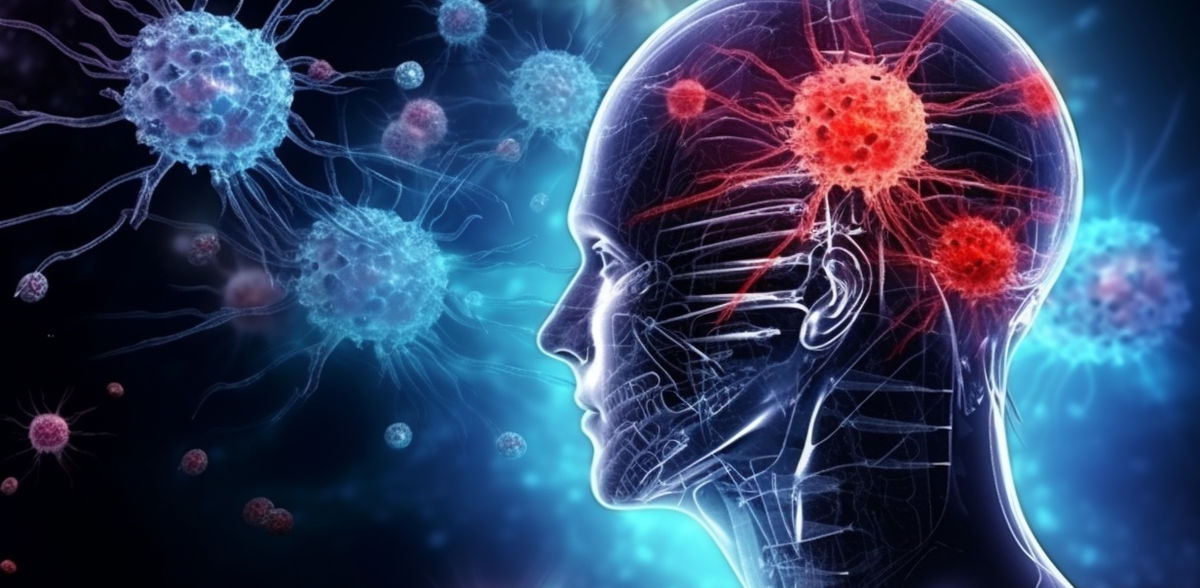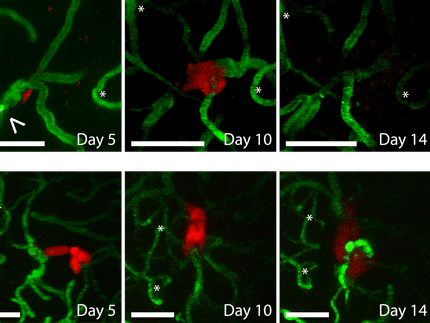Transgenic T cells against malignant brain tumors
New form of therapy tested
Advertisement
Scientists from the German cancer Research Center (DKFZ) and the University Medical Center Mannheim (UMM) successfully tested a new form of cellular immunotherapy against brain tumors in mice for the first time.
Glioblastomas are the most aggressive of all brain tumors. They spread diffusely in the brain and are difficult to remove completely by surgery. Chemotherapy or radiation therapy also often have limited effectiveness. To find new, more effective treatment options for those affected, doctors and scientists are testing numerous immunotherapeutic approaches, including so-called "adoptive" T-cell therapies: This involves isolationg T cells from the patient, modifying them in the culture dish and transferring them back to the patient. Doctors are pursuing a variety of approaches.
Lukas Bunse, a scientist at the German Cancer Research Center (Deutsches Krebsforschungszentrum, DKFZ) and a physician at the University Medical Center Mannheim, relies on the comparatively new concept of "T cell receptor transgenic cells" in his current study: To this end, brain tumor patients were first inoculated with an antigenic fragment of the protein NLGN4X (Neuroligin4X). This protein is involved in the formation of synapses. It is found in large quantities in glioblastoma cells, but is virtually undetectable in healthy brain tissue.
Bunse's team then isolated from the blood of the vaccinated individuals those T cells that had been activated by NLGN4X and consequently carried a T cell receptor that specifically "recognizes" this glioblastoma-associated antigen.
However, since only a few NLGN4X-specific T cells can be obtained in this way, which are not sufficient for cell therapy, the scientists resorted to a trick: they isolated the gene coding for the NLGN4X-specific T cell receptor. They were then able to use this to equip T cells from donor blood or also T cell lines in the culture dish. In this way, they succeeded in producing large numbers of T cells with identical specificity, all of which recognize the cancer antigen NLGN4X.
Bunse's team then demonstrated that the NLGN4X-specific T cells are able to kill brain tumor cells in the culture dish. Brain tumor-bearing mice treated with transgenic NLGN4X-specific human T cells had a greater than 40 percent response to treatment. The tumors shrank and the animals survived longer than untreated conspecifics.
After these initial studies had yielded such promising results, Lukas Bunse expects that vaccine-induced T-cell receptors targeting brain tumor antigens could be a promising approach to develop new immunotherapies against glioblastoma. In melanoma, the malignant black skin cancer, such T-cell receptor transgenic T cells have already been shown to prolong the lives of some patients. According to the scientist, it is also conceivable to generate T cell receptor transgenic cell therapies against patient-individual cancer antigens.
Much more advanced in clinical development than T-cell receptor transgenic cells are cellular therapies using so-called CAR-T (chimeric antigen receptor) cells, which have already been approved for the treatment of various leukemias and lymphomas. But the two cell therapy approaches differ in one important respect. "With the T-cell receptor transgenic cells, we can also target antigens that are only found inside cancer cells and whose fragments are exhibited on the cell surface via presentation molecules known as MHC class 1," explains Lukas Bunse. This is not possible with the receptor of the CAR-T cells.
Michael Platten, director of the Department of Neurology at the University Medical Center Mannheim and department head at the German Cancer Research Center, sums up, "We will now work intensively to be able to test this concept in the clinic."

























































